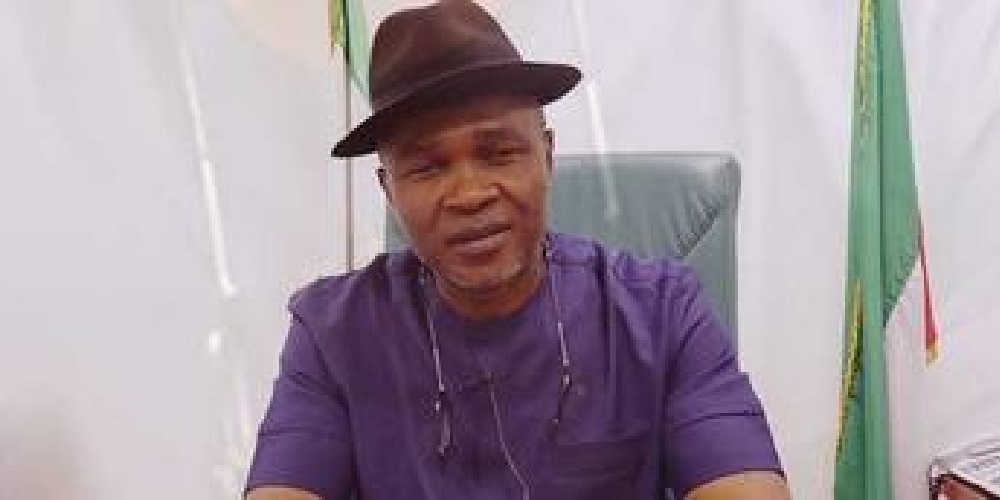News
June 12: 25years after, we’re failing Nigerians but democracy is far better than autocracy-Minority leader, Chinda

..if you doubt try autocracy
…says we’ve to be extremely careful as signs of failed state are already showing here
Minority Leader of the House of Representatives, Rep Kingsley Chinda has said despite so many failures recorded on the last unbroken 25years of democracy, it still remains the best form of government as autocracy as an option is suicidal.
Chinda who represents Obio/Akpor Federal Constituency of Rivers State, made this disclosure while chatting with journalists on Tuesday in Abuja stating that:
“Well I would have clearly been in that class of persons that would say, look there is nothing at all to talk about democracy in Nigeria.
“But I belong to the groups of persons that stood firmly against military rule in Nigeria. At least I’ve gone through detention while in school to say no to military rule.
“For anybody who thinks that democracy is not good, try autocracy. You will see the difference.
“And so I believe that the worst democratic government is better than the best autocratic government.
“We are seated here today talking to ourselves, speaking freely, because we have a democracy. There are days that you cannot sit with me in this room to hold this interview, even whilst I am the leader of opposition in the country.
“We need to hide in a conclave somewhere for us to discuss like this. And as we are discussing, we are watching our back.
“So democracy comes with its own advantages. And I can tell you that men generally seek democracy, so that we have had it for 25 years. It’s a thing of joy.
“But then the question is, 25 years of democracy, how well have we fared? Are we succeeding? Are we doing the right thing? Are we truly making maximal use of the democracy that we have? The answer is no. We are not faring very well.
“We are abusing the opportunity we have much more than using it to further our society. One clear example which I have always said, what is the primary purpose of government? Security of the citizens and their welfare, so, are we succeeding?
“If we talk about security in Nigeria today, it’s worse than it was 25 years back. 25 years back, you can travel from Port Harcourt to Sokoto, even at night.
” In school, I used to ply night bus from Port Harcourt to Lagos. Good morning Lagos, good night Port Harcourt. Finish the business of the day. At night, you go back to the bus station and then you’re back to Port Harcourt the following morning.
“But you can’t do that now, even in the afternoon today, to move from Port Harcourt to Abuja, because of the strike recently, I wanted to drive from Port Harcourt to Abuja. And everybody was screaming, why would you want to take such a risk?
“So, that primary purpose of government, providing security, we have not succeeded.
“Now you go to welfare, which is the second purpose of government, why we have all agreed that we elect a few persons to act in our stead, so that they will take care of our welfare.
“How well has government succeeded? The same answer is, government has failed. The welfare of Nigerians are not getting better. Our welfare 25 years back is better than what we have today.
“But there ought to have been improvements. 25 years back, public taps were flowing, public schools were doing well. We all attended public schools. Public health facilities were running.
“But today, Nigerians provide for themselves. You provide your security because you must get a security man in your house and you pay for it. You provide power for yourself. Most people are going for solar today because the public system has failed. You send your children to private schools because public schools have failed. That is, you also provide education for yourself.
“So, what do you actually owe the government and what does the government owe you? You owe obedience, compliance with laws and all that and that’s why you see most people, out of anger, will kick against the government of the day.
“So, whilst we celebrate democracy, yes, 25 years, but we must also take stock and remind ourselves that we are failing.
“And I would dare say that if we continue without taking a proper course, we are bound to disintegrate as a country because the signs of a failed state are there. Government is just struggling to hold back. At a point, the centre might no longer hold. So, we need to be careful as Nigerians.
On what opposition is doing to help rewrite the situation in Nigeria, Chinda said: “Very well. As opposition members of the parliament, we have taken some steps.
“Most recently, on the issue of security, you will recall after our meeting that we asked the government that in three months, which will expire in July, I think July 16th, that if there is no improvement in the area of security, that we might be compelled to take steps to call on Nigerians to begin to do things that the government might not be comfortable with.
“Now aside that, things like welfare, most recently, we talked about the cyber security issue and implementation of that law, which led to a lot of brouhaha in the society.
“We intervened quickly to say no. The Central Bank circular, which intended to impose fees on Nigerians, was not correct, and it should be withdrawn. Fortunately, the president reacted and responded to it and withdrew that circular.
“So we think that these are some of the roles that we should be playing to check some of the excesses of government and draw attention of Nigerians to this and also call on government to take steps to correct them in the interest of Nigerians.
“Well, like I said earlier, that through legislative intervention, we should strive towards accomplishing the main purpose of government.
“A major example is the Local Content Act that we have today is limited to the oil and gas sector. And because of that Local Content Act, you can agree with me that more Nigerians are becoming big players in the oil and gas sector. Knowledge is being developed.
“Yes, the general economy in the country is also hitting that sector. And so that’s why you see some of these oil, big oil giants, Shell, Elf, Mobil, and all that, talking about either downsizing or selling off their interest and all that.
“But who are those that are buying off those interests? Most of them are Nigerians. So this is the advantage of the Local Content Act in the oil and gas sector.
“And we felt that it would not be proper to limit it to that sector. It should also dovetail into all other aspects and facets of our economy, into construction, into medical, into ICT, and all that.
“So it will develop local capacity. It will give opportunity for our people to be big-time players in all these other fields. And then it will also give minimum requirements for local content in those areas.
“Now, an example, again, it’s the issues of unemployment. What it means is that for every locality where you go to establish these firms or these operations, those from that locality must produce at least the lower cadre of the staff of such firms. And there is provision of training in it.
“They are compelled by law to continue to do training for these persons and then also be prepared to hand over even the expatriates to the locals within a particular number of years.
News
Union seals Lagos company over racial discrimination of workers

The National Union of Textile, Garment and Tailoring Workers of Nigeria (NUTGTWN), an affiliate of the Nigeria Labour Congress (NLC), has shut down operations at MDV Sacks Ltd, a subsidiary of the Bhojsons Group, over alleged exploitation, inhumane treatment, and racial discrimination against over 300 Nigerian workers.
The company, located within the Lafarge Cement premises in Ewekoro, Ogun State, is accused of compelling its factory workers to pay N18,000 for protective boots while refusing to provide basic employment rights, including allowances, annual leave, and formal employment letters.
The union also alleged that MDV Sacks Ltd actively suppresses workers’ rights to unionize, a clear violation of Nigeria’s labour laws.
On Monday, members of the Textile Union, backed by other NLC-affiliated unions, stormed the factory in a protest that disrupted activities at the facility. The demonstrators, chanting solidarity songs and carrying placards with messages like “Injury to one is injury to all” and “MDV Lafarge management, stop harassment and intimidation of workers”, called on all employees to vacate the premises until their grievances are addressed.
While the majority of workers complied and walked out in support of the union, a handful reportedly remained on duty.
Deputy General Secretary of NUTGTWN, Comrade Emeka Nkwoala, who addressed journalists during the protest, expressed deep concern over the company’s failure to honour commitments reached during a mediation meeting held on May 7, 2025.
“At the meeting, it was agreed that union activities would be allowed to commence without obstruction and that workers would be given formal employment letters,” Nkwoala said.
“Unfortunately, the management of MDV Sacks Ltd has gone back on its word. Some of our members have been unjustly laid off, while others are subjected to degrading and exploitative working conditions. There are clear rules of engagement under Nigerian law, and we will not allow modern-day slavery to persist under any guise.”
Nkwoala further accused the company of fostering a culture of racial discrimination, alleging that Nigerian workers are treated unfairly in comparison to their expatriate counterparts.
He described the demonstration as peaceful and orderly, adding that the Ogun State Ministry of Labour has now stepped in to mediate. According to him, the Ministry has directed that the status quo be maintained, with sacked workers recalled and all outstanding entitlements paid.
The union has vowed to continue its advocacy until the affected workers receive justice and the company is held accountable for its actions.
News
CBN warns public against fraudsters claiming to act on its behalf

The Central Bank of Nigeria (CBN) has warned the public against the antics and activities of fraudsters, claiming to act on behalf of the apex bank through bogus claims or the award of fictitious contracts.
The CBN acting Director, Corporate Communications, Mrs. Sidi Ali Hakama, gave the warning in an advisory issued by the bank.
She said the attention of the CBN has been drawn to the activities of individuals and groups falsely claiming to represent or act on behalf of the apex bank, by circulating fictitious offers of contracts, loans, grants, intervention funds, and other financial benefits allegedly issued or endorsed by the CBN.
The CBN spokesperson expressed concern that despite the public advisory issued on November 18, 2024, through the bank’s official channels and news outlets, these misleading schemes have persisted, targeting unsuspecting members of the public with false and deceptive narratives.
Accordingly, the CBN reiterated that it has not authorised, licensed, or appointed any individual, group or organisation to act as an agent or intermediary in offering contracts, financial grants, or intervention funds to the public.
“The CBN also does not endorse or support such claims in any form.
“Members of the public are advised that the CBN does not award contracts or disburse funds through unsolicited communications such as e-mails, phone calls, SMS, WhatsApp, or any social media platform.
“It also does not request payment of fees in exchange for contracts, grants, or financial interventions, nor does it engage intermediaries or third parties to offer financial services or opportunities to the public.
“If you are approached by individuals or entities making such claims, we strongly advise that you do not engage with them.
“Instead, such incidents should be reported immediately to the relevant law enforcement agencies or the nearest CBN Branch,” the advisory stated.
The apex bank added that it remains committed to safeguarding the financial interests of the Nigerian public and will continue to work closely with security agencies to investigate and address fraudulent activities.
News
TETFUND threatens to cut financial support to non-performing institutions

The Tertiary Education Trust Fund (TETFUND) has threatened to cut financial support to beneficiary tertiary institutions that fail to meet performance benchmarks or mismanage allocated funds.
The agency said it would de-list such tertiary institutions from its support programmes.
Executive Secretary of TETFUND, Sonny Echono gave the warning at a one-day strategic engagement with heads of institutions, bursars, and heads of procurement of the agency’s beneficiary institutions in Abuja on Monday.
Echono said the policy was not meant to punish, but rather safeguard the credibility and impact of TETFUND interventions.
He said: “Let me be clear, institutions that consistently fail to access, utilise or retire funds appropriately, or that fall short of enrollment and academic performance thresholds, risk being delisted as TETFUND beneficiary institutions.”
He also disclosed the intention of TETFUND to ensure that its resources were directed towards institutions that were committed to high standards of governance, transparency, and accountability.
Echono said the strategic engagement was targeted at addressing recurring challenges in Nigeria’s tertiary education sector, improving project execution, and enhancing the quality of education.
A key focus, he said, was the Academic Staff Training and Development (AST&D) intervention.
He said due to rising costs and incidents of scholars absconding, the foreign component of the TETFUND Scholarship for Academic Staff (TSAS) was suspended as of January 1, 2025 with emphasis now shifted to cost-effective, locally driven training.
Echono said this year’s intervention budget prioritises consolidation, sustainability, and the completion of abandoned projects.
He added: “This engagement is not merely a meeting but a strategic convergence. It is designed to address recurring issues of concern, streamline project implementation, and enhance the overall quality of tertiary education delivery in our nation.
“As we move forward, let us approach today’s discussions with openness, collaboration, and a shared vision to elevate our institutions and the students we serve.
“Together, we can strengthen accountability, drive innovation, and ensure that the legacy of TETFUND remains impactful, equitable and enduring for generations to come.”
Executive Secretary of the National Universities Commission (NUC), Professor Abdullahi Ribadu emphasised the importance of the meeting for evaluating the implementation and impact of TETFUND – supported projects in higher education institutions.
The NUC chief, who was represented by Dr. Joshua Atah appreciated TETFUND’s vital role in improving infrastructure, research, staff development, and academic quality, stating that without its support, public education would struggle to survive.
Prof. Ribadu acknowledged the adaptability of TETFUND’s policies, such as suspending international scholarships to reallocate resources more effectively.
He urged tertiary institutions to be more responsive and ensure that interventions were relevant and efficiently executed.
Ribadu encouraged judicious and timely use of funds and called for open and constructive dialogue during the engagement.
“This calls for greater responsiveness also on the part of the institutions. This responsiveness also includes the areas of the design and implementation of these interventions to ensure that they remain relevant, impactful, and aligned with the future of education in Nigeria.
“It’s also important that we judiciously utilise these resources, and not just judicious utilisation but also in a timely manner so that we don’t lose the fund,” he said.
-

 News24 hours ago
News24 hours agoJust in: Wike admits Fubara alongside 2 govs visited him on reconciliatory moves
-

 News21 hours ago
News21 hours agoGo home to face corruption probe, protesters in London tell Kyari (Photos)
-

 News24 hours ago
News24 hours agoAMCON, Others Dragged to Court Over Alleged Undervalued Sale of Ibadan Disco for $62m
-

 News7 hours ago
News7 hours agoUS revokes governor’s visa
-

 News8 hours ago
News8 hours ago2nd Anniversary: Tinubu to commission Abuja International Conference Centre – Wike
-

 News17 hours ago
News17 hours agoUK unions slam Govt’s decision to end care worker visas
-

 News24 hours ago
News24 hours agoAfter quarter of a century, NDLEA gets forensic labs in Abuja, Enugu, trains 20 officers+Photos
-

 News16 hours ago
News16 hours agoSAD! Woman, child electrocuted in Edo





